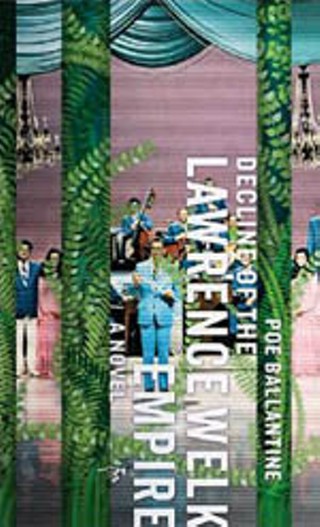Book Review: Readings
Poe Ballantine
Reviewed by Melanie Haupt, Fri., July 14, 2006

Decline of the Lawrence Welk Empire
by Poe Ballantine
Hawthorne, 376 pp., $15.95 (paper)
Young Edgar Donahoe is a burned-out surfer boy who has grown disenchanted with American society. What better way to escape the vagaries of commodity culture than to go to a Caribbean tourist trap, be devoured by rabid mosquitoes, and get stalked by deranged natives happy to butcher white folks where they stand? Sounds like paradise to Edgar. Too bad his hulking, volatile college buddy and host on the island, Mountain Moses, has such a seductive girlfriend and a short fuse.Decline of the Lawrence Welk Empire is a Seventies bildungsroman that paints a "portrait of the artist as a young mango," in which the young mango discovers that civilization isn't quite as overrated and debased as he thought, and friendship isn't everything it's cracked up to be. The story moves at a tornado's pace, whirling from San Diego to Colorado Springs to Poisson Rouge in the Lesser Antilles inside of 100 pages. Interspersed in the travelogue are Edgar's concise ruminations on consumer culture, drug use, divorce, and colonialism. A doomed love triangle is the crux of the story, although it's simply the conceit around which the author can write circles and show off his chops.
Poe Ballantine, in this sequel to God Clobbers Us All, reveals that he is a writer with a keen ear and a blistering wit. However, rather than tell the story from the perspective of a 21-year-old disco refugee, Ballantine is busy being a Writer. Edgar's narrative voice is not that of a marginally intelligent, disenfranchised young man; it is that of a middle-aged artiste. "A gash in the [papaya's] skin bleeds in beads of viscid white," Edgar narrates. Is this the syntax of a young surfer dude circa the late Seventies? I think not. It is this disconnect between a writerly author and his mouthpiece that hobbles this novel, although it is not an unpleasurable read. If readers can ignore Ballantine's almost Brechtian embrace of the unreality of art, they will enjoy the verbose Edgar's misadventures. Barring that, it's a prime opportunity to observe a writer's joyful wallow in the decadence of words.










